初中英语动词时态复习
初中英语六种时态复习课件(35张PPT)

②while 引导的从句表示“在……期间”,主从句谓语动词所表示的动 作同时ቤተ መጻሕፍቲ ባይዱ生。这时,主从句都用过去进行时。
e.g.:My father was reading the newspaper while my mother was watching TV.当我的妈妈看电视的时候,我的爸爸正在看报纸。
(2)表示普遍真理或客观事实。 e.g.:The sun rises in the east.太阳从东方升起。 (3)在条件状语从句和时间状语从句中,用一般现在时表示将来。 e.g.:If it doesn't rain tomorrow,we will go for a picnic.如果明天不下 雨,我们将去野餐。 (4)在某些以 here,there 开头的句子中用一般现在时表示正在发生的动作。 e.g.:There goes the bell.铃响了。
(3)现在进行时表示将来 表示位置移动的动词 go,come,leave,fly,start,meet,move 等, 可以用现在进行时表示将要发生的事。 e.g.:We are leaving for London.我们就要动身去伦敦了。
(4)一般现在时表示将来 ①表示按规定或时间表预计要发生的动作。 e.g.:Our plane takes off at 8:10.我们的飞机 8:10 起飞。 ②当主句为一般将来时,或含有情态动词,或是祈使句时,在 if,as soon as,until,when 等引导的状语从句中用一般现在时表示将来。 e.g.:I will give him the book as soon as he comes here.他一来这儿, 我就把这本书给他。
(2)表示当前一段时间内的活动或现阶段正在进行的动作。 e.g.:They are picking apples on a farm all the time.他们一直在农场 摘苹果。 (3)与 always,usually 等词连用,表达说话人强烈的感情,如赞扬、不 满、讨厌等。 e.g.:Mary is always thinking of others instead of herself.玛丽总是为 别人着想,而不为自己着想。
最新中考英语复习:初中六大时态复习课件

20
Book P4
1. Our science teacher said that light _____much faster than sound.
A.make B. will make C.am making D.making
2. Look! Some visitors ______for the bus over there.
A. are waiting B.is waiting C.waiting
D.wait
3.--- What is your mother doing, Linda?
用法:
1. 表示过去某一时刻或过去某个阶段正在进行的事或发生的 动作。
He fell asleep when he __wa_s__r_e_a_d_i_n_g___(read). We _w_er_e__w_a_t_c_h_i_ng___(watch) TV from seven to nine last night. He was cleaning his car while I __wa_s__c_o_o_k_i_n_g____(cook).
It was a clear day and warm now in the sun . The fog cleared from her eyes .
Keep silent.
Break the silence.
The electricity is off.
初中英语语法八大时态总结(完整版)
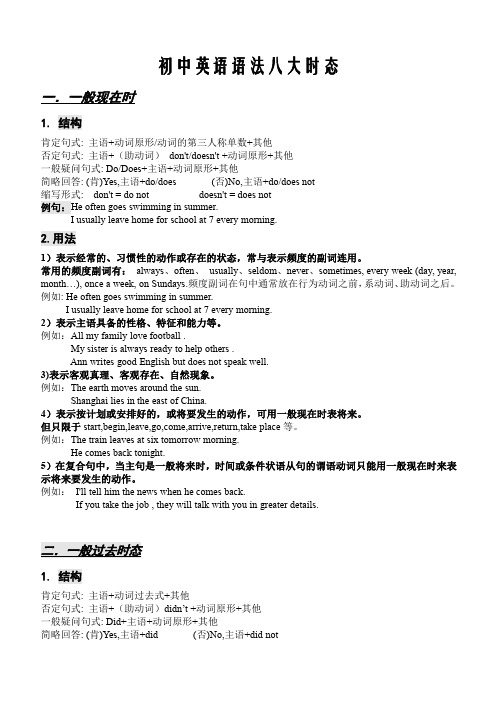
初中英语语法八大时态一.一般现在时1. 结构肯定句式: 主语+动词原形/动词的第三人称单数+其他 否定句式: 主语+(助动词) don't/doesn't +动词原形+其他 一般疑问句式: Do/Does+主语+动词原形+其他 简略回答: (肯)Yes,主语+do/does (否)No,主语+do/does not 缩写形式: don't = do not doesn't = does not 例句:He often goes swimming in summer. I usually leave home for school at 7 every morning.2.用法1)表示经常的、习惯性的动作或存在的状态,常与表示频度的副词连用。
常用的频度副词有: always、often、 usually、seldom、never、sometimes, every week (day, year, month…), once a week, on Sundays.频度副词在句中通常放在行为动词之前, 系动词、 助动词之后。
例如: He often goes swimming in summer. I usually leave home for school at 7 every morning. 2)表示主语具备的性格、特征和能力等。
例如:All my family love football . My sister is always ready to help others . Ann writes good English but does not speak well. 3)表示客观真理、客观存在、自然现象。
例如:The earth moves around the sun. Shanghai lies in the east of China. 4)表示按计划或安排好的,或将要发生的动作,可用一般现在时表将来。
初中英语知识归纳总结——动词的时态

初中英语知识归纳总结——动词的时态动词的时态(一)教学重点一般现在时在英语中,不同时间里以不同方式发生的动作或存在的状态,要用不同的动词形式来表示,动词的这种不同形式称为动词的时态。
时态从时间上划分,可分为四大类:现在时;过去时;将来时;过去将来时。
从行为上,每一类可以分为四种形式:一般式;进行式;完成式;完成进行式。
这样英语的动词合起来,总共有十六种时态,初中只需掌握其中的八种时态。
1、一般现在时(1)一般现在时表示现在的状态、习惯性的动作或主语所具备的性格和能力等。
①当动词是be时,第一人称用am,第二人称用is,其他人称用are.②当动词是实义动词时,一般用动词原形,但如果主语是第三人称单数时,动词必须用第三人称单数形式,其变化规则如下:助动词do(第三人称单数用does)构成否定句、疑问句及答语,但要注意助动词后原来的谓语动词要恢复原形。
例如:I like music.I don’t like music.Do you like music?Yes, I do No, I don’t(2)一般现在时的用法①表示经常、习惯性动作,常和often, usually, every day, sometimes, always 等时间状语连用。
如:He goes to school by bus every day.They often play football②表示能力、职业、特征。
如:Miss Gao teaches English.Do you speak Japanese?③表示客观存在。
如:The earth moves round the sun.Time and tide wait for no man.④表示已经安排好或计划好的事。
如The plane takes off at 7:30.Classes begin at 8:00⑤在时间状语和条件状语从句中,主句用一般将来时,从句用一般现在时。
初中英语中考复习时态讲解课件(共79张ppt)

一般现在时
1. 表示经常性或习惯性的动作
She does excersice everyday.
真题链接
—What do you often do at weekends?
—I often ____ my grandparents.
A. visit
B. visited
C. have visited D. will visit
Just a moment, I am washing dishes.
when
习题
Just a minute! My brother________ his car in the garden. A. washes B. is washing C. washed D. will wash
习题
---Hey, Tom. Let’s go swimming.
动词过去分词 不规则变化
speak hear see give build swim buy teach
spoken heard seen given built swum bought taught
现在完成时
already yet
1.过去发生或已完成的某一动作对现在的影响。
I have already watched this film. I haven't watched this film yet. I have already visited America. I haven't visited America yet.
A. prepares
B. is preparing
C. has prepared D. prepared
真题链接
--Mum, it's late. Why are you still here? --Dad hasn't come back yet. I ____ for him. A. am waitingB. was waiting C. waited D. had waited
初中英语时态知识点大全
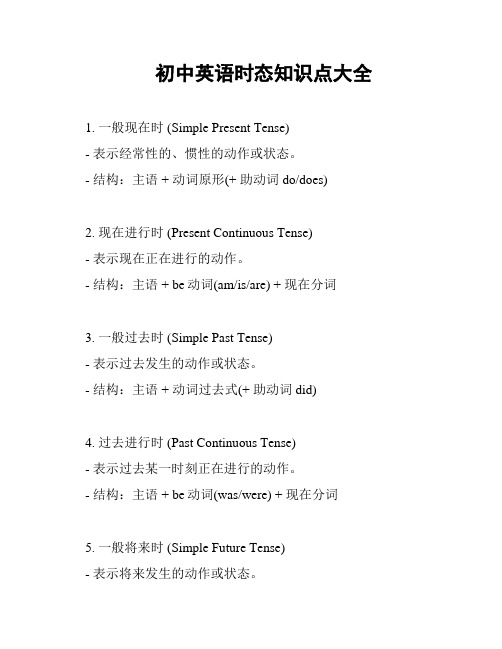
初中英语时态知识点大全1. 一般现在时 (Simple Present Tense)- 表示经常性的、惯性的动作或状态。
- 结构:主语 + 动词原形(+ 助动词do/does)2. 现在进行时 (Present Continuous Tense)- 表示现在正在进行的动作。
- 结构:主语 + be动词(am/is/are) + 现在分词3. 一般过去时 (Simple Past Tense)- 表示过去发生的动作或状态。
- 结构:主语 + 动词过去式(+ 助动词did)4. 过去进行时 (Past Continuous Tense)- 表示过去某一时刻正在进行的动作。
- 结构:主语 + be动词(was/were) + 现在分词5. 一般将来时 (Simple Future Tense)- 表示将来发生的动作或状态。
- 结构:主语 + will + 动词原形6. 现在完成时 (Present Perfect Tense)- 表示过去发生的动作对现在产生的影响。
- 结构:主语 + have/has + 过去分词7. 过去完成时 (Past Perfect Tense)- 表示在过去某一时刻之前已经发生的动作。
- 结构:主语 + had + 过去分词8. 将来进行时 (Future Continuous Tense)- 表示将来某一时刻正在进行的动作。
- 结构:主语 + will + be动词 + 现在分词9. 将来完成时 (Future Perfect Tense)- 表示将来某一时刻之前已经完成的动作。
- 结构:主语 + will + have + 过去分词10. 现在完成进行时 (Present Perfect Continuous Tense)- 表示从过去某时开始持续到现在的动作并可能继续下去。
- 结构:主语 + have/has + been + 现在分词11. 过去完成进行时 (Past Perfect Continuous Tense)- 表示过去某时开始,持续到过去某时并有可能继续下去的动作。
初中英语六种时态归纳复习(精编word)

初中英语六种时态归纳复习时态是英语学习中一个至关重要的内容一、一般现在时:概念:经常、反复发生的动作或行为及现在的某种状况。
时间状语:always, usually, often, sometimes, every week (day, year, month…), once a week, on Sundays, etc.基本结构:①be动词;②行为动词否定形式:①am/is/are+not;②此时态的谓语动词若为行为动词,则在其前加don't,如主语为第三人称单数,则用doesn't,同时还原行为动词。
一般疑问句:①把be动词放于句首;②用助动词do提问,如主语为第三人称单数,则用does,同时,还原行为动词。
二、一般过去时:概念:过去某个时间里发生的动作或状态;过去习惯性、经常性的动作、行为。
时间状语:ago, yesterday, the day before yesterday, last week(year, night, month…), in 1989, just now, at the age of 5, one day, long long ago, once upon a time, etc.基本结构:①be动词;②行为动词否定形式:①was/were+not;②在行为动词前加didn't,同时还原行为动词。
一般疑问句:①was或were放于句首;②用助动词do的过去式did 提问,同时还原行为动词。
三、一般将来时:概念:表示将要发生的动作或存在的状态及打算、计划或准备做某事。
时间状语:tomorrow, next da y(week, month, year…),soon, in a few minutes, by…,the day after tomorrow, etc.基本结构:①am/is/are/going to + do;②will/shall + do.否定形式:①was/were + not; ②在行为动词前加didn't,同时还原行为动词。
初中英语时态总结
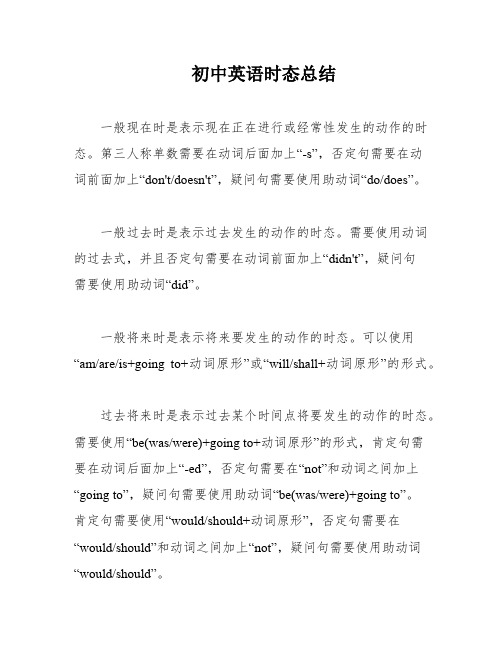
初中英语时态总结一般现在时是表示现在正在进行或经常性发生的动作的时态。
第三人称单数需要在动词后面加上“-s”,否定句需要在动词前面加上“don't/doesn't”,疑问句需要使用助动词“do/does”。
一般过去时是表示过去发生的动作的时态。
需要使用动词的过去式,并且否定句需要在动词前面加上“didn't”,疑问句需要使用助动词“did”。
一般将来时是表示将来要发生的动作的时态。
可以使用“am/are/is+going to+动词原形”或“will/shall+动词原形”的形式。
过去将来时是表示过去某个时间点将要发生的动作的时态。
需要使用“be(was/were)+going to+动词原形”的形式,肯定句需要在动词后面加上“-ed”,否定句需要在“not”和动词之间加上“going to”,疑问句需要使用助动词“be(was/were)+going to”。
肯定句需要使用“would/should+动词原形”,否定句需要在“would/should”和动词之间加上“not”,疑问句需要使用助动词“would/should”。
英语中有12个主要时态,分别来自于过去、现在和将来三个时间点。
以"I listen"为例,我们可以看到这些时态的不同表达方式:一般现在时:I listen现在进行时:I am XXX过去进行时:I was listening现在完成时:I have XXX除此之外,还有其他的时态,如过去完成时、将来完成时等等。
其中,有些时态需要借助助动词或时间状语来表达,如"by the end of"、"before"、"will have been doing"等。
需要注意的是,有些时态的表达方式比较相似,但含义上有所区别,如现在完成时和现在完成进行时。
初中英语语法专项复习英语动词时态和语态讲解和练习题
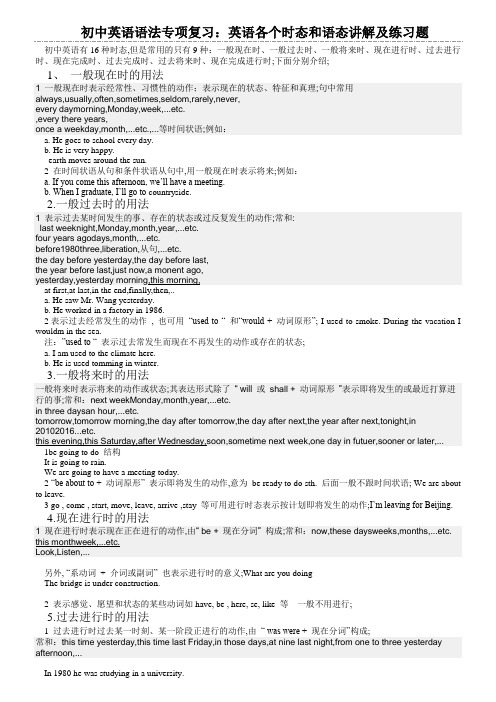
初中英语语法专项复习:英语各个时态和语态讲解及练习题初中英语有16种时态,但是常用的只有9种:一般现在时、一般过去时、一般将来时、现在进行时、过去进行时、现在完成时、过去完成时、过去将来时、现在完成进行时;下面分别介绍;1、一般现在时的用法1 一般现在时表示经常性、习惯性的动作;表示现在的状态、特征和真理;句中常用always,usually,often,sometimes,seldom,rarely,never,every daymorning,Monday,week,...etc.,every there years,once a weekday,month,...etc.,...等时间状语;例如:a. He goes to school every day.b. He is very happy.earth moves around the sun.2 在时间状语从句和条件状语从句中,用一般现在时表示将来;例如:a. If you come this afternoon, we’ll have a meeting.b. When I graduate, I’ll go to countryside.2.一般过去时的用法1 表示过去某时间发生的事、存在的状态或过反复发生的动作;常和:last weeknight,Monday,month,year,...etc.four years agodays,month,...etc.before1980three,liberation,从句,...etc.the day before yesterday,the day before last,the year before last,just now,a monent ago,yesterday,yesterday morning,this morning,at first,at last,in the end,finally,then,..a. He saw Mr. Wang yesterday.b. He worked in a factory in 1986.2表示过去经常发生的动作, 也可用“used to “ 和“would + 动词原形”; I used to smoke. During the vacation I wouldm in the sea.注:”used to “ 表示过去常发生而现在不再发生的动作或存在的状态;a. I am used to the climate here.b. He is used tomming in winter.3.一般将来时的用法一般将来时表示将来的动作或状态;其表达形式除了“ will 或shall + 动词原形”表示即将发生的或最近打算进行的事;常和:next weekMonday,month,year,...etc.in three daysan hour,...etc.tomorrow,tomorrow morning,the day after tomorrow,the day after next,the year after next,tonight,in 20102016...etc.this evening,this Saturday,after Wednesday,soon,sometime next week,one day in futuer,sooner or later,...1be going to do 结构It is going to rain.We are going to have a meeting today.2 “be about to + 动词原形” 表示即将发生的动作,意为be ready to do sth. 后面一般不跟时间状语; We are about to leave.3 go , come , start, move, leave, arrive ,stay 等可用进行时态表示按计划即将发生的动作;I’m leaving for Beijing.4.现在进行时的用法1 现在进行时表示现在正在进行的动作,由“ be + 现在分词” 构成;常和:now,these daysweeks,months,...etc. this monthweek,...etc.Look,Listen,...另外, “系动词+ 介词或副词” 也表示进行时的意义;What are you doingThe bridge is under construction.2 表示感觉、愿望和状态的某些动词如have, be , here, se, like 等一般不用进行;5.过去进行时的用法1 过去进行时过去某一时刻、某一阶段正进行的动作,由“ was were + 现在分词”构成;常和:this time yesterday,this time last Friday,in those days,at nine last night,from one to three yesterday afternoon,...In 1980 he was studying in a university.He was reading a novel when I came in.6.现在完成时的用法现在完成时由“have/has + 过去分词.其使用有两种情况:1 现在完成时所表示的动作在说话之前已完成,但对现在有影响;句中没有具体时间状语;常和:just,alreadly,yet,never,ever,now,before,this week,today,these days,once,twice,three times,...He has gone to Fuzhou.He has been to Fuzhou.2 现在完成时所表示的动作开始于过去,持续到现在,也许还会持续下去常用for 和since表示一段时间的状语或since then1949,last Monday,two o'clock,从句...,etc.,ever since then,for three daysa long time,two hours,...etc.so far , now, today, this wek month, year 等表示包括现在内的状语;He has studied English for 5 years.He has studied English since 1985.Now I have finished the work..注意:表示短暂时间动作的词如come, go , die, marry, buy 等的完成时不能与for, since 等表示一般时间的词连用;正确:I have bought the book already.错误:I have bought the book for two years.改:I have had the bookl for two years.7.过去完成时的用法1 过去完成时由“had + 过去分词”构成;过去完成时的动作表示过去某一时刻或某一时刻或某一动作之前完成的动作或状态;句中常用by then1977,yesterday,eight last night,the time we got there,...etc.by the end of last termweek,year,month,...etc..by, before, until, when 等词引导的时间状语;By the end of last year we had built five new houses.I had learnt 5000 words before I entered the university.2过去完成时的动词还可表示过去某一时刻之前发生的动作或状态持续到过去某个时间或持续下去;Before he slept, he had worked for 12 hours.8.过去将来时的用法过去将来时表示从过去的某个时间看来将要发生的动作或存在的状态;过去将来时由“should 或would + 动词原形” 构成;第一人称用should, 其他人称用would. ;常和:They were sure that they would succeed.二动词语态1.当句子的主语是动作的执行者时, 谓语的形式叫主动语态;句子的主语是动作承受者时,谓语的形式叫被动作语态;被动语态由助动词be + 过去分词构成,时态通过be 表现出来;1 一般现在时:You are required to do this.2 一般过去时:The story was told by her.3 一般将来时:The problem will be discussed tomorrow.4 现在进行时:The road is being widened.5 过去进行时:The new tool was being made.6 现在完成时:The novel has been read.7 过去完成时:He said that the work had been finished.8 过去将来时:He said that the trees would be planted soon.2. 一些特殊的被动结构1 带情态动词的被动结构:The problem must be solved soon.2 带不定式的被动结构:The room is going to be painted.The homework needs to be done with care.3 短语动词的被动:a.不及物动词+介词:若这类短语动词是及物性的,则可用于被动语态中,如:laugh at, look after, talk about, think of 等;若这类短语动词是不及物性的则不可用于被动语态中,如:book up, look down. 等b.及物动词+副词:bring about, carry out, find out, make out, put away, put off, take up, turn down, turn out, wipe out 等c. 动词+副词+介词:do away with, face up to, give into ,look down upon, make up with等d. 动词+名词+介词:catch sight of, keep on eye on, make a fool of , pay attention to , put an end to , set fire/light to , take notice of 等4 带复合宾语的动词在改为被动语态时,一般把主动结构中的宾语改为主语,宾语补足语保留在谓语后面;We always keep the classroom clean.比较:The classroom is always kept clean.5主动形式表示被动意义的词;常见的有:a.主动形式,这时动名词同句中的主语有动宾关系;The children need looking after.The windows wants /requires repairing.This point deserves mentioning.练习题1. It is a fine day. The sun __________shine brightly.2. They ___________visit the Science Museum next Sunday.3. Mr Brown________live in Beijing since he came to China.4. Mr Wang ________teach us English two years ago.5. The Smiths _______________ watch TV at this time last night.6. We __________learn about ten English songs by the end of last term.7. Father said that he ____________buy a new bike for me the next Friday.8. Bill isn¡¯t here. He ___________chat with his friends in the classroom.9. The teacher said that the moon __________go round the earth.10. The Young Pioneers will go to the zoo if it ____________not rain this Sunday.11. Listen They __________talk about the new film.12. Jim asked us what ___________happen in China in 1976.13. My mobile phone ___________steal on a bus last week.14. The host ____________interview the little boy just now.15. The Greens __________watch TV now.16. He said that he _____________ring me up when he got there.17. We ____________learn English for about three years.18. My brother_____________join the League in 1997.19. The farmers __________pick apples when I saw them.20. The red skirt __________cost the girl forty yuan.21. The film ____________begin when I got to the cinema.22. The girl told me that she wanted to be an English teacher when she _____grow up.23. My sister is a student and she _____________study at a middle school nearby.24. Mr Green __________travel to several places in South China since he came here.25. You _________catch the early bus if you get up early.26. _______you been________wear glasses all the time27. I’ll go home as soon as I _______finish my homework.29. Most science books are ______write in English.30. I ____________stay there for two months last year.31. Tell Lily to call me as soon as she _______.A. will arriveB. gets thereC. has goneD. reach here32. ----Hi, Kate. You look tired. What’s the matter ----I ______ well last night.A. didn’t sleepB. don’t sleepC. haven’t sleptD. won’t sleep33. ----Excuse me, look at the sign over there, please. Could you stop smoking----Sorry, I ____ that.A. didn’t seeB. don’t seeC. won’t seeD. can’t see34. ----Well, I found this. I think it must be yours. ----My watch Thank you. Where _____itA. do you findB. had you foundC. were you findingD. did you find35. ----Don you know when Dr White ____ for dinner this evening----No, but I think he ____ when he is free.A. will come; comesB. will come; will comeC. comes; comesD. comes; will come36. Look at those black clouds. It _____ rain. Let’s hurry. A. maybe B. would C. has D. is going to37. ----Jimmy is leaving for a holiday. ----Really Where ____ he ____A. has; goneB. will; goC. did; goD. does; go38. ----Shall we go shopping now ---Sorry, I can't. I ____ my shirts.A. washB. washesC. washedD. am washing39. ----I called you yesterday evening, but there was no answer.----Oh, I am sorry. I ___ dinner at my friend's home.A. haveB. hadC. was havingD. have had40. The Oriental Pearl TV Tower ____ thousands of visitors since 1995.A. attractedB. attractsC. has attractedD. will attract46. ----Why didn't you go to the cinema yesterday -----Because I ____ the film before.A. had seenB. have seenC. have watchedD. has watched47. I don't think John saw me. He ____ a book at that moment.A. just readB. has just readC. was just readingD. had just read48. Mr Smith ____ a book about China last year but I don't know whether he has finished it.A. has writtenB. wroteC. had writtenD. was writing49. Mr White ____ the newspaper while his daughter ____TV.A. has read; was watchingB. was reading; watchedC. was reading; was watchingD. reading; watched50. ---- I ____ you at the meeting. Why ----I was ill. A. saw B. have seen C. not see D. didn't see51. The 29th Olympic Games ____ in Beijing in 2008. A. hold B. will hold C. will be held D. held52. Hurry up The play ____ for ten minutes. A. has been on B. has begun C. had begun D. began53. ----May I speak to Mr Smith ----Sorry, he ____ Australia. But he ____ in two days.A. has been to; will come backB. has gone to; will be backC. has been in; would come backD. is leaving for; doesn't come back54. I can't go to the theater tonight because I ____ my ticket.A. have lostB. had lostC. will loseD. was losing55. ----What a nice bike How long ____ you ____ it ----Just two weeks.A. have; boughtB. did; buyC. have; hadD. are; having56. ----I'm sorry to have kept you waiting. ----Oh, not at all. I ____ here only for a few minutes.A. have comeB. had beenC. wasD. have been57. ----____ my dictionary anywhere ---- Yes. I saw it on your desk a moment ago.A. Did you seeB. If you seeC. Had you seenD. Would you see58. We were all surprised when he mad it clear that he ____ office soon.A. leavesB. would leaveC. will leaveD. had left答案:I. 1. shines/ is shining 2. are going to/ will visit 3. has lived 4. taught5. were watching6. had learned7. would buy8. is chatting9. goes 10.doesn't rain 11. are talking 12. happened 13. was stolen 14. interviewed15. are watching16. would ring 17. have learned 18. joined 19. were picking 20. cost21. had begun 22. grew 23. studies 24. has traveled 25. will catch26. Have; wearing 27. finish 28. haven't heard 29. written 30. stayedII. 31--35 BAADB 36--40 DBDCC 41--45 ACBAC 46--50 ACDCD51--55 CABAC 56--60 DABDA 61--65 BDBAB 66-70 BDABC 71--75 BCADD。
初中英语知识点时态总结
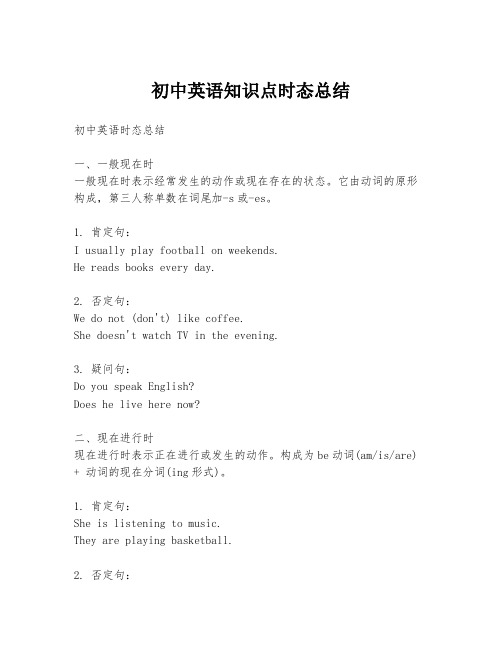
初中英语知识点时态总结初中英语时态总结一、一般现在时一般现在时表示经常发生的动作或现在存在的状态。
它由动词的原形构成,第三人称单数在词尾加-s或-es。
1. 肯定句:I usually play football on weekends.He reads books every day.2. 否定句:We do not (don't) like coffee.She doesn't watch TV in the evening.3. 疑问句:Do you speak English?Does he live here now?二、现在进行时现在进行时表示正在进行或发生的动作。
构成为be动词(am/is/are) + 动词的现在分词(ing形式)。
1. 肯定句:She is listening to music.They are playing basketball.2. 否定句:I am not (aren't) studying right now.The children are not (aren't) doing their homework.3. 疑问句:Is she cooking dinner?Are you waiting for someone?三、一般过去时一般过去时表示过去某个时间发生的动作或存在的状态。
规则动词在词尾加-ed,不规则动词则有特殊形式。
1. 肯定句:He walked to school yesterday.I visited my grandparents last week.2. 否定句:We did not (didn't) go to the cinema.She didn't buy anything at the store.3. 疑问句:Did you travel abroad last year?Did he finish his homework?四、过去进行时过去进行时表示过去某个时间点正在进行的动作。
英语中考归纳复习专题:动词的时态
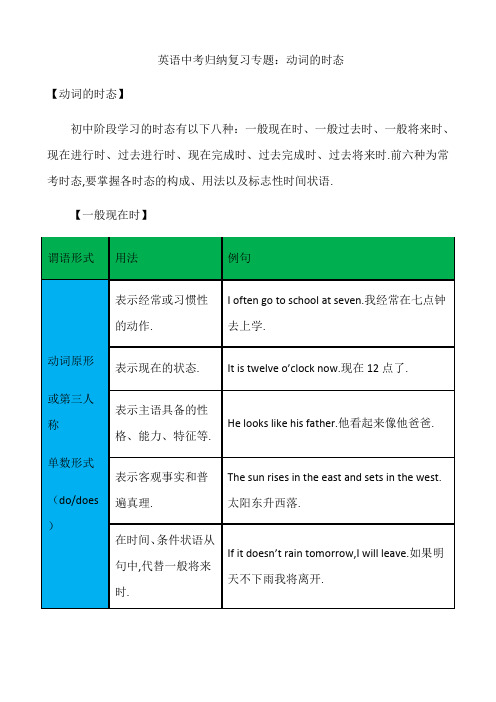
英语中考归纳复习专题:动词的时态【动词的时态】初中阶段学习的时态有以下八种:一般现在时、一般过去时、一般将来时、现在进行时、过去进行时、现在完成时、过去完成时、过去将来时.前六种为常考时态,要掌握各时态的构成、用法以及标志性时间状语.【一般现在时】【考点训练1】1.My father is a teacher and he _________ (teach) in a middle school.2.Yesterday the teacher told us the earth _______ (go) around the sun.3.—When shall we begin our meeting?—We’ll begin it when Helen ___ . ()esB.cameC.will comee4.—How do you usually go to school?—I usually ___ to school on foot. ()A.goB.wentC.was goingD.will go答案:teaches goes A A【一般过去时】要点提醒:“used to+动词原形”表示过去的习惯或状态.如:Mum used to tell us stories.妈妈过去常给我们讲故事.【考点训练2】1.Mike ________ (not go) to bed until 12 o’clock last night.2.He asked if I _____ (be) a student.3.Will you please say it again?I ___ quite ___ you.()A.don’t;hearB.didn’t;hearC.don’t;heardD.didn’t;heard4.He _____ go out with his parents,but now he ____ staying at home alone. ()ed to;is used toB.is used to;used toe to;is used toed to;used to答案:didn’t go was B A【一般将来时】要点提醒:be going to与will的区别1.be going to 指已计划好的事或思考过的意图、打算,will表示未事先思考或未计划而临时做出的决定.如:I’m going to see him tomorrow.我打算明天去看他.(事先经过思考)I’ll answer the door.我去开门.(未经事先考虑)2.be going to可表示客观迹象表明马上要发生的事,而will则表明说话者的主观意愿.如:Look at the clouds.There is going to be a storm.看看这些云,暴风雨就要来了.(客观迹象表明要发生)I hope it will be warm tomorrow.我希望明天会暖和起来.(主观意愿)3.在含有条件状语从句的复合句的主句中,一般用will,不用be going to. 如:I will come if it doesn’t rain.如果不下雨的话,我就来.【考点训练3】1.____ a concert in our school next Saturday. ()A.There isB.There areC.There will beD.There will have2.If they can arrive by 9:00 am,we ___ a meeting.()A.haveB.will haveC.hadD.would have3.He ___ her a beautiful hat on her next birthday.()A.givesB.gaveC.will givingD.is going to give答案:C B D 【现在进行时】【考点训练4】1.They ____________ (have) a math test in the classroom now.2.Look! He ___________ (lie) on the beach.3.—Pass the raincoat to me.It ___ hard now.—Here you are. ()A.rainB.is rainingC.rainedD.will rain4.—Cathy,can you answer the door?I ___ the room.—I’m coming,Mum. ()A.CleanB.cleanedC.have cleanedD.am cleaning答案:are having is lying B D【过去进行时】He was forever com plaining about something.他老是怨这怨那.要点提醒:1.在含有时间状语从句的复合句中,延续时间较长的动作常用过去进行时,另一个短暂性动作用一般过去时.如:When the UFO landed,I was shopping at the clothes store.当UFO落地时,我正在服装店买衣服.2.表示两个延续性动作在过去某一时刻同时进行,不考虑动作的先后顺序,主句和从句的谓语动词都用过去进行时,连词常用while.如:Tom was doing his homework while I was reading a newspaper.我在看报纸时,汤姆在做作业.【考点训练5】1.Mike and I ___________ (play) basketball at that time yesterday afternoon.2.While Mr.Johnson _______________ (work) in the office,the phone rang.3.The girl ___ for the bus when the rainstorm came.()A.waitedB.have waitedC.is waitingD.was waiting4.—Jenny,I called you at nine last night,but you didn’t pick up.—Oh,I ____ a popular program called Go Fighting!.()A.watchB.watchedC.was watchingD.am watching答案:were playing was working D C【现在完成时】要点提醒:1.have/has been to,have/has gone to与have/has been in(考点讲解详见P74考点1)2.延续性动词与非延续性动词英语中的动词按动作发生的方式、发生过程的长短可分为延续性动词和非延续性动词两种,非延续性动词也可称为短暂性动词或瞬间动词.在现在完成时态中,有时要将非延续性动词转换为延续性动词,这样才能和时间段连用.转换方法如下:(1)将短暂性动词转换为“be+形容词或副词”.请看下表:如:这间商店开门6小时了.The shop has opened for 6 hours.( ×)The shop has been open for 6 hours.( √)(2)有的短暂性动词可以转换为意思相同的延续性动词.请看下表:如:这本书我借了一个月了.I have borrowed the book for one month.( ×)I have kept the book for one month.( √)3.现在完成时与一般过去时的区别现在完成时强调某一动作或状态对现在造成的影响或结果,不能和表示过去的时间状语连用;一般过去时只表示过去的事实,不表示和现在的关系,可以和表示过去的时间状语连用.如I bought a ticket yesterday.我昨天买了一张票.(强调我昨天做的一件事是买票)I have already bought a ticket.我已经买了一张票.(强调我已经有票了,无须再惦记票的事了)4.现在完成时的其他句型【考点训练6】1.—you _____ your homework yet?—Yes.I ______ it a moment ago. ()A.Did;do;finishedB.Have;done;finishedC.Have;done;have finishedD.Will;do;finish2.His father ___ the Party since 1978. ()A.joinedB.has joinedC.was inD.has been in3.Miss Green isn’t in the office.She to the library. ()A.has goneB.wentC.will goD.has been 答案:B D A【过去完成时】had + 过去分词表示在过去的过去发生的动作或存在的状态.I had had three pieces of cake when you arrived.你来的时候我已经吃了三块蛋糕了.表示过去某一动作或状态持续到过去另一时间.The old man had lived in Shanghai for ten years beforeTom came here.汤姆来这儿之前,这个老人已经住在上海十年了.时间标志by the time...,before,when等构成的短语或引导的从句【考点训练7】1.在我们到达电影院之前,电影已经开始了.The film __________ before we _______ to the cinema.2.警察赶到时,小偷已经逃跑了.When the police __________,the thief____________________ .答案:had begun got arrived had run away 【过去将来时】【考点训练8】1.李明说如果布莱恩下个月来中国,他将会很高兴.Li Ming said he ___________ happy if Brian came to China the next month.2.蒂娜说她下周三打算来参加我的生日派对.Tina said she ________________ my birthday party the next Wednesday.答案:would be was going to【中考示例】(2017·广西)If he _____ Guilin,he’ll probably go to Yangshuo. ( )A.visitsB.is visitingC.will visitD.has visited【解析】考查动词的时态.句意:如果他游览桂林,他有可能会去阳朔.if引导条件状语从句时,时态遵循“主将从现”原则,从句中用一般现在时表示将来.【考题热身】1.(2017·甘肃)I promise I ________ (send) you an email to explain all of these tomorrow.2.(2017·甘肃)Be quiet! The patients ______________(sleep).3.(2017·鄂州)Sandy’s grandparents__________________ (marry) for 50 years.4.(2017·台州改编)A true friend always ____________(support) you whenever youare in trouble.5.(2017·宿迁)I ______________(wash) the dishes while my sister was sweeping the floor.6.(2017·云南)—What do you think of your hometown, Kate?—It a lot.It’s more beautiful than before. ()A.has changedB.changesC.will changeD.change7.(2017·武汉)—Linda is not coming for the party tonight.—But she ______!()A.promisesB.promisedC.will promiseD.had promised8.(2017·毕节)It’s nice to see you again.We ___ each other since 2016. ()A.won’t seeB.haven’t seenC.don’t seeD.didn’t see9.(2017·黔东南)If it doesn’t rain this weekend,we ___ a picnic in the Jinquan Park. ()A.haveB.will haveC.have hadD.had10.(2017·上海)Some exchange students ___ with their host families this time yesterday. ()A.are chattingB.will chatC.were chattingD.have chatted11.(2017·重庆B卷)—Where is your uncle?I haven’t seen him for a long time. —He _____ Beijing for about half a year.He moved there in January. ()A.has gone to B.has been toC.has arrived inD.has been in12.(2017·重庆B卷)John and I ___ to visit his grandparents last Sunday afternoon. ()A.goB.wentC.will goD.have gone13.(2017·重庆A卷)In the past few years,many schools ____ the ways of doing morning exercises. ()A.changeB.changesC.will changeD.have changed14.(2017·重庆A卷)As soon as the rain _____ ,they will go out to pick apples. ()A.stopsB.stoppedC.will stopD.is stopping15.(2017·河北)Don’t take the dictionary away.I ___ it. ()eedC.am usingD.have used答案:will send are sleeping have been married supports A B BBCDBDAC。
初中英语动词时态总结

初中英语动词时态总结一、一般现在时 (Simple Present Tense)一般现在时表示经常性或习惯性的动作、真理、客观事实、感觉或状态等。
其句型构成为:主语 + 动词原形(第三人称单数加 -s/-es)。
例句: - I play football every Sunday. (我每个星期天踢足球。
) - She likes to read books. (她喜欢读书。
) - Cats are cute animals. (猫是可爱的动物。
)二、一般过去时 (Simple Past Tense)一般过去时表示过去发生或存在的动作或状态。
对于规则动词,其句型构成为:主语 + 动词过去式。
例句: - Amy danced at the party last night. (艾米昨晚在派对上跳舞了。
) - They studied hard for the exam. (他们为考试努力学习。
) - We watched a movie together yesterday. (我们昨天一起看电影。
)三、一般将来时 (Simple Future Tense)一般将来时表示将要发生或存在的动作或状态。
其句型构成为:主语 + will +动词原形。
例句: - I will visit my grandparents next weekend. (下个周末我会去看望我的祖父母。
) - She will start a new job next month. (她下个月会开始一份新的工作。
) - They will have a party to celebrate their anniversary. (他们将会举办派对庆祝他们的周年纪念。
)四、现在进行时 (Present Continuous Tense)现在进行时表示现在正在进行的动作。
其句型构成为:主语 + am/is/are + 动词-ing。
英语动词的时态题20套带答案
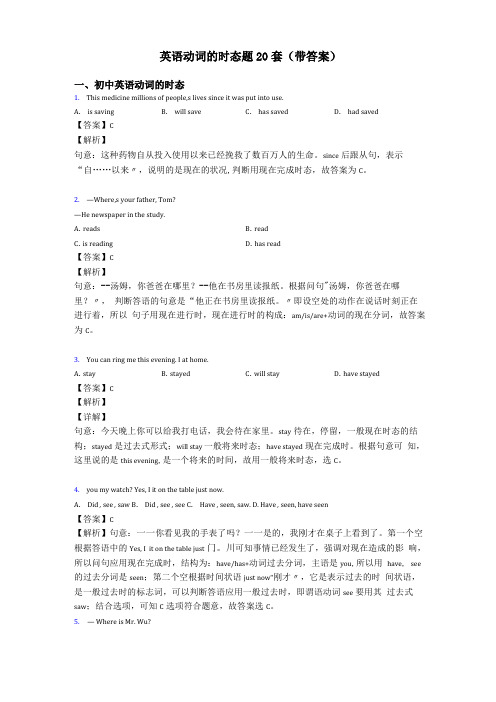
英语动词的时态题20套(带答案)一、初中英语动词的时态1.This medicine millions of people,s lives since it was put into use.A. is savingB. will saveC. has savedD. had saved【答案】C【解析】句意:这种药物自从投入使用以来已经挽救了数百万人的生命。
since后跟从句,表示“自……以来〃,说明的是现在的状况,判断用现在完成时态,故答案为C。
2.—Where,s your father, Tom?—He newspaper in the study.A.readsB.readC.is readingD.has read【答案】C【解析】句意:--汤姆,你爸爸在哪里?--他在书房里读报纸。
根据问句"汤姆,你爸爸在哪里?〃,判断答语的句意是“他正在书房里读报纸。
〃即设空处的动作在说话时刻正在进行着,所以句子用现在进行时,现在进行时的构成:am/is/are+动词的现在分词,故答案为C。
3.You can ring me this evening. I at home.A.stayB.stayedC.will stayD.have stayed【答案】C【解析】【详解】句意:今天晚上你可以给我打电话,我会待在家里。
stay待在,停留,一般现在时态的结构;stayed是过去式形式;will stay 一般将来时态;have stayed现在完成时。
根据句意可知,这里说的是this evening,是一个将来的时间,故用一般将来时态,选C。
4.you my watch? Yes, I it on the table just now.A. Did , see , sawB. Did , see , seeC. Have , seen, saw.D. Have , seen, have seen【答案】C【解析】句意:一一你看见我的手表了吗?一一是的,我刚才在桌子上看到了。
初中英语知识归纳动词的三种时态
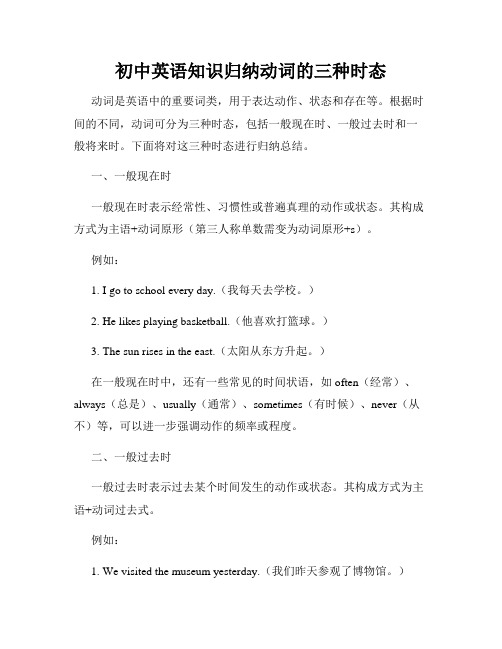
初中英语知识归纳动词的三种时态动词是英语中的重要词类,用于表达动作、状态和存在等。
根据时间的不同,动词可分为三种时态,包括一般现在时、一般过去时和一般将来时。
下面将对这三种时态进行归纳总结。
一、一般现在时一般现在时表示经常性、习惯性或普遍真理的动作或状态。
其构成方式为主语+动词原形(第三人称单数需变为动词原形+s)。
例如:1. I go to school every day.(我每天去学校。
)2. He likes playing basketball.(他喜欢打篮球。
)3. The sun rises in the east.(太阳从东方升起。
)在一般现在时中,还有一些常见的时间状语,如often(经常)、always(总是)、usually(通常)、sometimes(有时候)、never(从不)等,可以进一步强调动作的频率或程度。
二、一般过去时一般过去时表示过去某个时间发生的动作或状态。
其构成方式为主语+动词过去式。
例如:1. We visited the museum yesterday.(我们昨天参观了博物馆。
)2. She studied English last night.(她昨晚学习了英语。
)3. They went to the park two days ago.(他们两天前去了公园。
)一般过去时中也有常见的时间状语,如yesterday(昨天)、last week(上周)、in 1990(在1990年)等,用于明确表示动作发生的具体时间或时间范围。
三、一般将来时一般将来时表示将要发生的动作或存在的状态。
其构成方式为主语+will+动词原形。
例如:1. I will visit my grandparents tomorrow.(我明天将去看望我的祖父母。
)2. She will study abroad next year.(她明年将出国留学。
)3. We will have a party on Friday.(我们将在星期五举行聚会。
初中英语八种时态复习
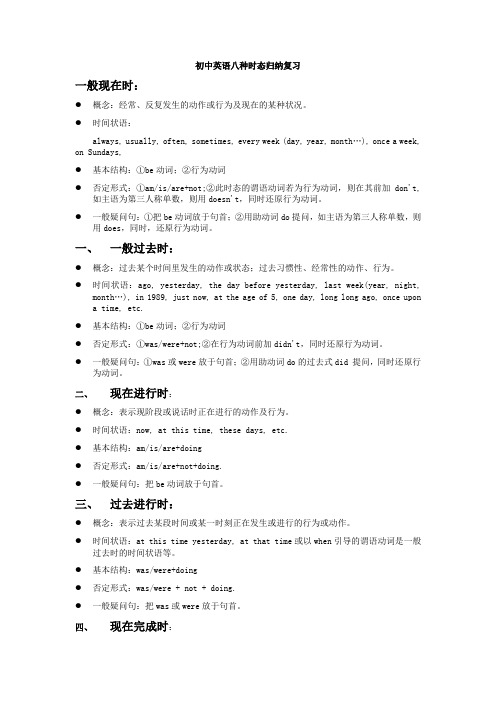
初中英语八种时态归纳复习一般现在时:●概念:经常、反复发生的动作或行为及现在的某种状况。
●时间状语:always, usually, often, sometimes, every week (day, year, month…), once a week, on Sundays,●基本结构:①be动词;②行为动词●否定形式:①am/is/are+not;②此时态的谓语动词若为行为动词,则在其前加don't,如主语为第三人称单数,则用doesn't,同时还原行为动词。
●一般疑问句:①把be动词放于句首;②用助动词do提问,如主语为第三人称单数,则用does,同时,还原行为动词。
一、一般过去时:●概念:过去某个时间里发生的动作或状态;过去习惯性、经常性的动作、行为。
●时间状语:ago, yesterday, the day before yesterday, last week(year, night,month…), in 1989, just now, at the age of 5, one day, long long ago, once upona time, etc.●基本结构:①be动词;②行为动词●否定形式:①was/were+not;②在行为动词前加didn't,同时还原行为动词。
●一般疑问句:①was或were放于句首;②用助动词do的过去式did 提问,同时还原行为动词。
二、现在进行时:●概念:表示现阶段或说话时正在进行的动作及行为。
●时间状语:now, at this time, these days, etc.●基本结构:am/is/are+doing●否定形式:am/is/are+not+doing.●一般疑问句:把be动词放于句首。
三、过去进行时:●概念:表示过去某段时间或某一时刻正在发生或进行的行为或动作。
●时间状语:at this time yesterday, at that time或以when引导的谓语动词是一般过去时的时间状语等。
初中英语语法动词八种时态详解
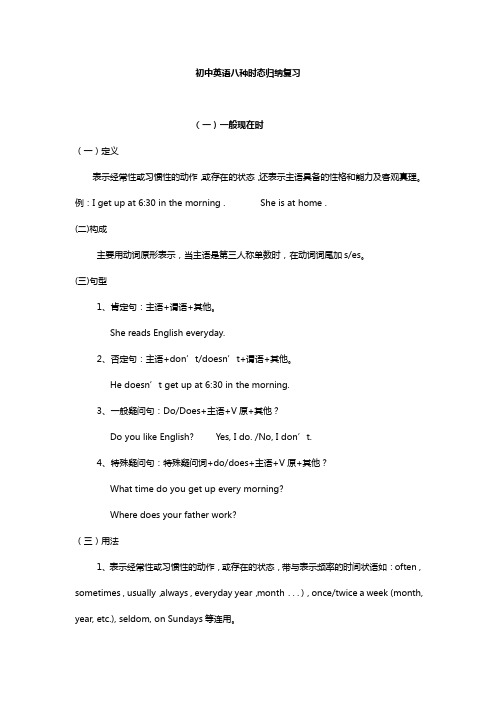
初中英语八种时态归纳复习(一)一般现在时(一)定义表示经常性或习惯性的动作,或存在的状态,还表示主语具备的性格和能力及客观真理。
例:I get up at 6:30 in the morning . She is at home .(二)构成主要用动词原形表示,当主语是第三人称单数时,在动词词尾加s/es。
(三)句型1、肯定句:主语+谓语+其他。
She reads English everyday.2、否定句:主语+don’t/doesn’t+谓语+其他。
He doesn’t get up at 6:30 in the morning.3、一般疑问句:Do/Does+主语+V原+其他?Do you like English? Yes, I do. /No, I don’t.4、特殊疑问句:特殊疑问词+do/does+主语+V原+其他?What time do you get up every morning?Where does your father work?(三)用法1、表示经常性或习惯性的动作,或存在的状态,带与表示频率的时间状语如:often , sometimes , usually,always , everyday year,month...), once/twice a week (month, year, etc.), seldom, on Sundays等连用。
I leave home for school at seven every morning.2、表示客观真理,科学事实、格言警句。
The sun rises in the east .日出东方。
The earth goes around the sun .地球绕着太阳转。
Ten minus two is eight.十减二等于八。
Light travels faster than sound .光的速度比声音的速度快。
初中英语时态总结
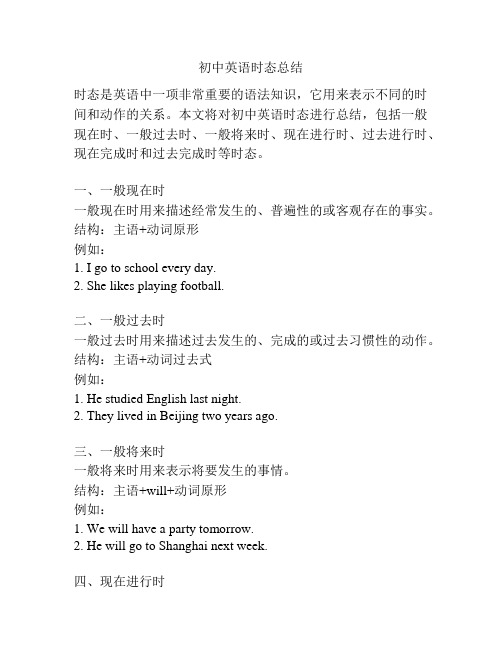
初中英语时态总结时态是英语中一项非常重要的语法知识,它用来表示不同的时间和动作的关系。
本文将对初中英语时态进行总结,包括一般现在时、一般过去时、一般将来时、现在进行时、过去进行时、现在完成时和过去完成时等时态。
一、一般现在时一般现在时用来描述经常发生的、普遍性的或客观存在的事实。
结构:主语+动词原形例如:1. I go to school every day.2. She likes playing football.二、一般过去时一般过去时用来描述过去发生的、完成的或过去习惯性的动作。
结构:主语+动词过去式例如:1. He studied English last night.2. They lived in Beijing two years ago.三、一般将来时一般将来时用来表示将要发生的事情。
结构:主语+will+动词原形例如:1. We will have a party tomorrow.2. He will go to Shanghai next week.四、现在进行时现在进行时用来描述现在正在进行的动作或状态。
结构:主语+be(am, is, are)+动词-ing例如:1. She is studying for the test now.2. They are playing basketball in the park.五、过去进行时过去进行时用来描述过去某个时间正在进行的动作。
结构:主语+was/were+动词-ing例如:1. I was studying when she called me.2. They were cooking dinner at 7 o'clock yesterday.六、现在完成时现在完成时用来表示过去发生的动作对现在造成的影响或与现在相关的动作。
结构:主语+have/has+动词过去分词例如:1. He has finished his homework.2. We have visited the Great Wall.七、过去完成时过去完成时用来表示过去某个时间或动作之前已经完成的动作。
初中英语八种时态归纳复习
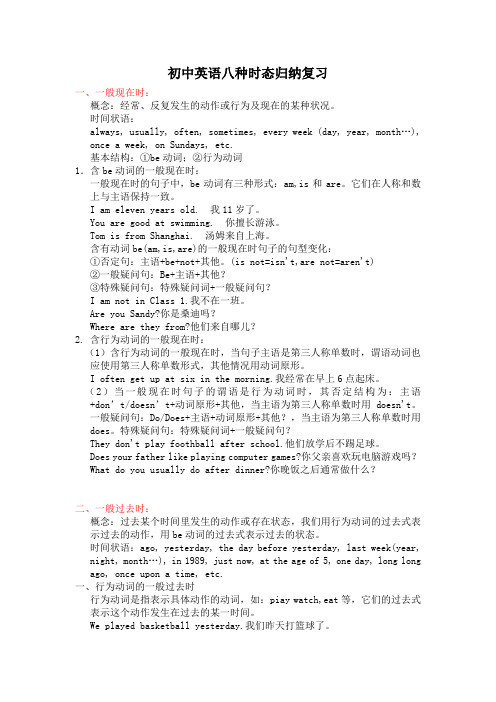
初中英语八种时态归纳复习一、一般现在时:概念:经常、反复发生的动作或行为及现在的某种状况。
时间状语:always, usually, often, sometimes, every week (day, year, month…), once a week, on Sundays, etc.基本结构:①be动词;②行为动词1.含be动词的一般现在时:一般现在时的句子中,be动词有三种形式:am,is和are。
它们在人称和数上与主语保持一致。
I am eleven years old. 我11岁了。
You are good at swimming. 你擅长游泳。
Tom is from Shanghai. 汤姆来自上海。
含有动词be(am,is,are)的一般现在时句子的句型变化:①否定句:主语+be+not+其他。
(is not=isn't,are not=aren't)②一般疑问句:Be+主语+其他?③特殊疑问句:特殊疑问词+一般疑问句?I am not in Class 1.我不在一班。
Are you Sandy?你是桑迪吗?Where are they from?他们来自哪儿?2. 含行为动词的一般现在时:(1)含行为动词的一般现在时,当句子主语是第三人称单数时,谓语动词也应使用第三人称单数形式,其他情况用动词原形。
I often get up at six in the morning.我经常在早上6点起床。
(2)当一般现在时句子的谓语是行为动词时,其否定结构为:主语+d on’t/doesn’t+动词原形+其他,当主语为第三人称单数时用doesn't。
一般疑问句:Do/Does+主语+动词原形+其他?,当主语为第三人称单数时用does。
特殊疑问句:特殊疑问词+一般疑问句?They don't play foothball after school.他们放学后不踢足球。
- 1、下载文档前请自行甄别文档内容的完整性,平台不提供额外的编辑、内容补充、找答案等附加服务。
- 2、"仅部分预览"的文档,不可在线预览部分如存在完整性等问题,可反馈申请退款(可完整预览的文档不适用该条件!)。
- 3、如文档侵犯您的权益,请联系客服反馈,我们会尽快为您处理(人工客服工作时间:9:00-18:30)。
( ) 4. Look! Lily __________ there. A. dances B. danced C. is dancing
( ) 5. ----There is little meat in the fridge(冰箱) now, Tom! ----- Don’t worry, Mom. I _____ some soon. A. buy B. bought C. will buy
用 括号内所给的动词的适当形式填空。
海口市金盘实验学校 叶丹娇
现在让我们一起回忆已经学过的时态,到现在 为至,我们学过的时态有:
一般现在时 general present tense 一般过去时 general past tense 现在进行时 present continuous tense 过去进行时 past continuous tense 一般将来时 future tense 下面请同学们来完成以下五题:
The weather is fine today.
The weather was fine yesterday.
He plays football every weekend. He played football last weekend.
He can (not)swim now.
He could (not)swim 3 years ago.
(have) 5、I came in while Ms Green _w_a_s_c_o__o_k_in_g_ .
(cook)
同学们,你做对了吗?你是怎么做对的?做错了也
没关系,我们一一学习!
-
30
关注-----动词在时态中的形式:
1、动词原形 2、动词第三人称单数:1)一般情况加-s ; likes 2)以s, x, sh, ch, 辅音字母+o结尾的动词,加es; goes 3)以辅音字母加y 结尾的动词,变y 为i,再加es。 studies
真题演练----- 一般现在时与一般过去时的对比
1. Lucy usually__A____ to school .
10
A walks
B is walk
C is walking
剖析:这是2012年安徽省中考题,看三个选项,就知道考查
时态,根据句子里的标志usually, 我们就确定选一般现在时:用
3、现在分词:1)一般情况加-ing ; reading
2)以不发音的字母e结尾的动词,去掉e,再加-ing; skat(e)ing
3)以重读闭音节结尾的动词,末尾只有一个辅音字母,双
写这个辅音字母,再加-ing。 swimming 4、过去式:规则变化 1)一般情况加-ed; 2)以e结尾的动词加-d; liked
般过去时!根据一般过去时的构成,故选B。
ห้องสมุดไป่ตู้
( ) 1. They usually____TV in the evening. A. watch B. will watch C. watches
( ) 2 . ___ he ___ a good time last Sunday? A. Were; were B. Did; do C. Did; have
用了does,后面动词要还原
Does Ms Li often watch TV?
一般现在时:主语为
三单(她/它/他/某人 Yes, she does. / No, she doesn't.
某物/天气等不可数名 词)疑问、否定要借
She doesn't often watch TV.
助助动词does
She often travels.
再看下图 The people were cleaning Hongchen Lake at 2:30 yesterday afternoon.
昨天这个时候,也就是下午2:30那些人在红城湖里做什么
昨天这个时候,也就是下午2:30那些大妈在广场做什么?
The old women were dancing on the square at 2:30 yesterday afternoon.
usually, often, sometimes, every day/month/Monday/ ...., in the evening, on
动词原形/ 第三人称单数 形式
Sunday....
一般过去时
yesterday, yesterday
动词的过去式
morning/afternoon..., (-ed 或 不规 Last week/..., in 2011.... 则动词)
动词第三人称单数,所以答案是A。
2.---Where’s your father?
---I’m not sure. He ___B____ to Xi’an yesterday.
A. goes B. went C. was go
剖析:这是陕西省中考题,我们一看题干中有“yesterday”, 就知道是一般过去时的标志,再分析这个对话的场景,的确是用一
Does he often play football?
Did he play football last week?
-Yes, he does. No, he doesn't.
-Yes, he did. / No, he didn't.
What do you usually do?
What did you do last night?
现在我们在句子里找出现在进行时的构成!
What are you doing now? I’m watching TV.
过去进行时
Jerry was swimming at this time yesterday.
现在我们正在上课,而昨天的这个时候Jerry在 做什么?Look at a picture.
What do you often do at home ?
I often watch TV.
1.现在请同学们找出每个句子的一 般现在时态的标志,它是什么?
What do you often do at home ? I often watch TV.
2.现在我们在这两个句子里找到一般现 在时的构成。
一般过去时
I played with my brother, then I cleaned my room.
What did you do yesterday?
小明问他的好友Tom昨天做了啥,你们 知道他做什么了吗?
刚才我们的动画呈现了两种时态,请看看 它们的标志和构成:
时态 标志
构成
一般现在时
Let’s do some exercises about tenses we have learned.
1、Look! The boy _is__r_e_a_d_in_g_ a book. (read) 2、 I often __w__a_lk____to school.(walk) 3、They ___h_a_d__ fun last weekend.(have) 4、People _w_i_ll_h__a_v_e__ robots in 100 years.
4. Tommy isn't very rich, but he often ______ (give) money to the poor.
5. While my mother _______( read), I was watching TV. 6. -When ____ your mother ____ (buy) you that red dress
-I usually watch TV.
-I watched TV .
一般过去时:主要用来表示过__去__发生的动作或状态。 常与过__去__的__时__间__状__语连用, 如:ye_s_te_r_d_a_y_(昨天),
_l_a_s_t_w_e_e_k(上周),t_h_r_e_e_y_e_a_r_s_a_g(o三年以前) , in 1978….
5、Ms Green _w__a_s_c_o_o_k_in_g_ when I came in. (cook)
提示:一找标志:when I came in (came是come的过去式)
二定时态:过去进行时 三写构成:was cooking
下面我们一一分解各种时态
同学们,现在我们利用动画情景 来理解一般现在时和一般过去时 , 请看对话。
- Sorry, I really can't remember.
展示两组句子,让学生对比发现不同.
be动词(is,am, are,was ,were) 情态动词can/could
助动词do/does/did
I am (not)13 this year.
行为动词(实意动词)
I was (not)13 last year.
2、 I often ____w_a_lk___to school.(walk)
提示:一找标志:often 二定时态:一般现在时 三写构成:walk
Let’s try how to use the trilogy三部曲.
3、They __h_a_d___ fun last weekend.(have) 提示:一找标志 last weekend(过去 时间) 二定时态: 一般过去时 三写构成:had
(让我们尝试如何用三部曲做下面各题)
